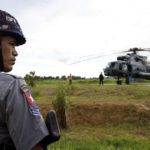The Soviet invasion of Afghanistan on December 26, 1979, reshaped the future of Central Asia and South Asia. The invasion plunged Afghanistan into a bloody civil war which is continuing to-date. After the Soviet withdrawal, there was a civil war for the control of Kabul amongst various Mujahedeen factions. During the infighting, the Taliban suddenly appeared in Kandahar and their rise was so swift that they were able to manage Afghanistan’s political affairs in the matters of Shariah.
Pakistan, Saudi Arab and the UAE recognised the Taliban government after it took power in 1996.It was on October 7, 2001, when the US started bombing Afghanistan after the 9/11 attacks in New York, Pennsylvania and Washington. The US blamed Al-Qaida for being behind the attack. The Taliban government sheltered Osama who master minded the strikes. The Musharraf government agreed to side with the US and allowed it to use Pakistan’s air space and bases. Karzai was appointed to lead an interim government and the International Security Assistance Force (ISAF) was deployed. In the 2014 election, Karzai became the first president.
The Taliban regrouped in the South and East of Afghanistan and launched an insurgency. The strength of the US troops rose to around one lac by 2010. Osama was killed on May 2, 2011, in a US Special Forces operation in Abbottabad. In 2014 Ashraf Ghani was elected as president of Afghanistan but the Taliban continued their attacks on coalition forces and Afghan government forces.
Today, the Afghan Taliban controls major parts of Afghanistan and the government is too weak to face them. In mid-2018, Americans and Taliban representatives started discreet talks in Qatar for the future of Afghanistan. On February 29, 2020, the Trump administration and the Taliban signed a historic deal in Doha according to which the US was to pull out its troops by May 1, 2021. The Biden administration is not meeting the May 1 dead line set as according to it, the withdrawal will be completed by September 2021 so that it coincides with 9/11.
According to the Washington Post, more than 2000 US serviceman were killed and more than one lac Afghan civilians have been killed or injured. Ahead of the formal announcement of the US troops’ withdrawal from Afghanistan, US Secretary of State Antony Blinken spoke to COAS General Bajwa. General Bajwa has welcomed the announcement of withdrawal from Afghanistan.
Now, let us have a look at the Indian interest and involvement in Afghanistan. After independence, Nehru’s government backed Afghan claims and projected so called Pashtunistan as well as the Durand Line issue. During the cold war, India and Afghanistan supported the Soviet Union and Pakistan was taken as a common enemy. During the civil war, India supported the Northern Alliance against Taliban. Later, India supported the government of Karzai and Ashraf Ghani against Pakistan.
India’s obsession with Afghanistan is primarily for its use as a potential pressure point against Pakistan. India’s entire Afghan policy is determined by its desire to confront Pakistan with the prospect of a two front war. India wants to establish a close rapport with anti-Pakistan groups to pressurise Pakistan. India is also trying to keep Afghanistan away from joining any organisation with Pakistan, Turkey, Iran and the Central Asian States. The main objective of India is political instability and chaos in Afghanistan which suits the Indian interest.
India has already starteda misinformation campaign according to which Lashkar-e-Taiba and Jaish-e-Muhammad will use Afghan territory against India. India is afraid of losing its control in Afghanistan. Recently, the Indian Chief of Defence has shown his concern that the withdrawal will create a vacuum which will enable Pakistan to gain an advantage because of its close ties with Afghan Taliban.
The implications of withdrawal for Pakistan are far-reaching. First of all, Pakistan has to request the Afghan Taliban to agree with the new proposal and deadline and to refrain from targeting Afghan security and coalition forces. A friendly government in the west is in the best interest of Pakistan. India in the last 20 years has had good relations with Afghan governments, NDS and terrorist organisations operating from there. The deal was not possible without Pakistan’s support. Pakistan considerable influence over the Taliban succeeded in bringing them to the negotiating table. The New York Times termed the US withdrawal as a victory for Pakistan.
The US spent a trillion dollars and there were no gains. The Taliban think they have won the war and are confident of their victory in any future struggle internally as well. The one concern is that if no agreement is concluded on power sharing between the various groups in Afghanistan, this may lead to another civil war and yet another influx of refugees into Pakistan.
Today, the Taliban are more confident that they will achieve military victory because they negotiated from a position of strength. Power sharing arrangements need to be worked out and a political map acceptable to all in Afghanistan must be made. India needs to roll back its presence in Afghanistan and stop its anti-Pakistan activities from its consulate in Herat, Jalalabad, Kandahar and Mazar Shareef. India should also be asked to wind up their terrorist training camps. Pakistan has paid a heavy price in the socio-economic, security and political fields for its role in Afghanistan. Pakistan would continue with its effort for a peaceful and prosperous Afghanistan. The Afghan government must cease the opportunity for peace according to the aspirations of the people of Afghanistan. Without peace in Afghanistan, there can be no peace in Pakistan.













